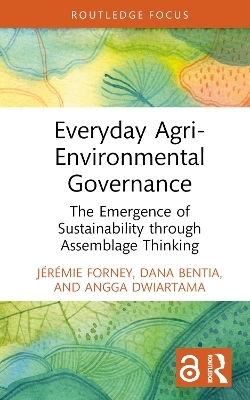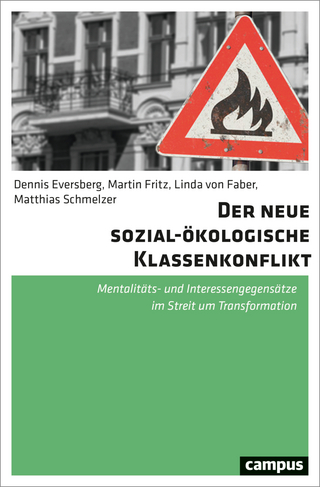
Everyday Agri-Environmental Governance
Routledge (Verlag)
978-1-032-22132-8 (ISBN)
Revitalising the way the social sciences question agri-environmental governance, this book introduces "the everyday governance approach" as a means to improving the sustainability of agriculture and food systems.
The "everyday" refers to localised practices, specific networks, and practical norms that emerge in a process of interaction, translation, and reinterpretation. The authors build this approach on assemblage thinking and theory, which focuses on the collective production of the social through complex sets of connections. For this reason, assemblage thinking becomes a particularly productive guide in exploring how everyday governance is co-produced in the interaction between numerous social processes involving a diversity of actors and instruments. The authors navigate between original and contrasting case studies from Switzerland, Indonesia, and the European Union in order to reorient attention to the transformative nature of governance, which they locate along four different dimensions of the everyday: (1) the interdependence of instruments within a wider governance assemblage; (2) the uncertainty and unpredictability of effects in agri-environmental governance; (3) the distributed nature of agency and its implication for power relations; (4) the importance of capacities in the transformation of agri-food systems. This book calls for a redesigning of agri-environmental governance that should move away from the setting of fix and precise objectives and solutions, and rather aim for a consolidation of sound foundations on which desirable futures can emerge.
The book will be an essential read for students and scholars interested in sustainable agriculture and food systems, governance modes and approaches, and sustainability more broadly.
The Open Access version of this book, available at www.taylorfrancis.com, has been made available under a Creative Commons Attribution- Non Commercial- No Derivatives (CC- BY- NC- ND) 4.0 license.
Jérémie Forney is a Full Professor at the Anthropology Institute of the University of Neuchâtel, Switzerland. He is the co-author of Agri-environmental Governance as an Assemblage (Routledge, 2018). Dana Bentia is an Associate Researcher at the Anthropology Institute of the University of Neuchâtel, Switzerland. Angga Dwiartama is an Associate Professor in Biomanagement in the School of Life Sciences and Technology at the Institut Teknologi Bandung, Indonesia.
Chapter 1: Everyday agri-environmental governance and the assemblage perspective
Chapter 2: Heterogeneous governance assemblages: mapping the cases
Chapter 3: Unpredictability of effects in agri-environmental governance
Chapter 4: Power, agency, and desire in everyday governance
Chapter 5: Reframing change in governance assemblages: properties, capacities, and basins of attraction
Chapter 6: Governing emergence towards the transformation of agri-food assemblages
| Erscheinungsdatum | 09.07.2024 |
|---|---|
| Reihe/Serie | Routledge Focus on Environment and Sustainability |
| Verlagsort | London |
| Sprache | englisch |
| Maße | 138 x 216 mm |
| Gewicht | 450 g |
| Themenwelt | Sozialwissenschaften ► Soziologie ► Spezielle Soziologien |
| Technik | |
| Weitere Fachgebiete ► Land- / Forstwirtschaft / Fischerei | |
| ISBN-10 | 1-032-22132-1 / 1032221321 |
| ISBN-13 | 978-1-032-22132-8 / 9781032221328 |
| Zustand | Neuware |
| Informationen gemäß Produktsicherheitsverordnung (GPSR) | |
| Haben Sie eine Frage zum Produkt? |
aus dem Bereich


